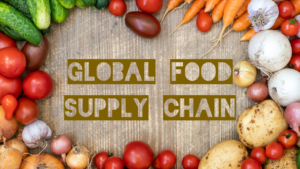Today’s papers are carrying stories about what appears to be the final collapse of the so-called Doha Round of trade negotiations [“Trade Talks Crumble in Feud Over Farm Aid,” by Anthony Faiola and and Rama Lakshmi, Washington Post, 30 July 2008 and “After 7 Years, Talks on Trade Collapse,” by Stephen Castle and Mark Landler, New York Times, 30 July 2008]. The collapse of the talks is not entirely unexpected — they have been failing for seven years. Since the focus of the talks was agricultural trade, it’s ironic that they collapsed in a year when food shortages and high food prices have captured so many headlines.
For the record, this is not the first time that Doha Round talks have collapsed. I was writing on the same subject at the same time last year [Doha Trade Talks & Globalization’s Future]. In that post, I noted that “developing states want tariffs removed from agricultural products imported into developing nations, while farmers in developing states fear that an influx of cheap agricultural products from abroad will ruin the market for domestic products.” This year’s food shortages has raised the fear of collapsing domestic markets to the level of a security issue and has entrenched the position of developing states just as the developed states were willing to make concessions.
I went on to note: “Emotions always run high whenever domestic food production is discussed. History is filled with tales of famine and death and that specter haunts the collective conscience of most nations. The Economist [“The Future of Globalization,” 27 July 2006], however, believes a diminishing commitment to global trade is also at fault.
‘It is not just the narrow business of the Doha round (if narrow is a fit adjective for an ambition to lift millions out of poverty, curb rich countries’ ruinous farm support and open markets for countless goods and services) that is at stake. In the long run, the lack of commitment to multilateral trade that sank the Doha round this week will also start to corrode the trading system as a whole.’
“To me, the collapse of the Doha round of trade talks demonstrates that the international system is not as resilient as it could or should be. It also indicates the abject failure of leadership by developed nations in putting forth a vision and paradigm to lift the less developed nations into a position where they can be fully integrated nations sharing in the benefits of globalization.” Returning to what happened this year, Faiola and Lakshmi report:
“The failure of the talks after nine days of intense negotiations underscored what is likely to be the biggest challenge in coming years to expanding world trade: the reluctance of emerging juggernauts such as India and China to risk their newfound success by offering rich nations greater access to the hundreds of millions of consumers rising out of poverty in the developing world. High-level delegations from the United States and the European Union showed fresh willingness at the World Trade Organization talks to make concessions that would have gradually curbed the subsidies and tariffs they have long employed to protect First World farmers. But India and China dug in their heels, insisting on the right to keep protecting their farmers while accusing the United States and other rich countries of exaggerating the generosity of their concessions.”
India and China undoubtedly relish their newfound global influence and honestly believe their positions are in the best interests of their agricultural sectors, but most pundits also believe their positions are shortsighted and threaten the future of global trade. For both of these emerging juggernauts, that would be disastrous. Faiola and Lakshmi continue:
“‘The breakdown of these talks is bad news for the world’s businesses, workers, farmers and most importantly the poor,’ said Thomas J. Donohue, president of the U.S. Chamber of Commerce. ‘It’s ironic that this blow … came from two of the chief beneficiaries of worldwide trade. India and China are emerging powers, but with great power comes great responsibility. They missed an opportunity to show leadership as key players in the global trading system.’ The result is what most experts concede is at least a temporary mothballing of the Doha Round of trade talks, so named because a group of nations agreed to work toward dramatic new cuts in subsidies and trade tariffs in Qatar’s capital, Doha, in 2001. The talks have floundered for the past seven years, with negotiations falling apart each time trade ministers have gathered to try to hash out an accord.”
Castle’s and Landler’s article agree that this latest collapse is a setback for globalization.
“The failure appeared to end, for the near term at least, any hopes of a global deal to further open markets, cut farm subsidies and strengthen the international trading system. ‘It is a massive blow to confidence in the global economy,’ said Peter Power, spokesman for the European Commission. ‘The confidence shot in the arm that we needed badly will not now happen.’ … Supporters of the so-called Doha round of talks, which began in 2001, say a deal would have been a bulwark against protectionist sentiments that are likely to spread as economic growth falters in much of the world. The failure also delivers a blow to the credibility of the World Trade Organization, which sets and enforces the rules of international commerce. It could set back efforts to work out other multilateral agreements, including those intended to reduce the threat of global warming. The collapse of the talks will not bring an end to world trade, of course, which will continue under current agreements, many of which are between two or more countries rather than under the W.T.O. But it is a big setback, particularly to the hopes of smaller and poorer developing countries, which were counting on gaining greater access to consumers in the United States, Europe and Japan.”
The consequences of this latest failure to reach an agreement are that bilateral and regional trade agreements will remain the focus of trade negotiations and protectionist tendencies will increase. While Americans might be tempted to point to China’s role in the breakdown of talks as evidence of its malicious designs against the free world, America’s skirts certainly aren’t clean when it comes to rising protectionism and anti-trade sentiment. There are members on both sides of the political aisle who are speaking out against free trade agreements. Denouncing such agreements has also been a staple of Barack Obama speeches throughout the campaign. For a man whose campaign adds talk about making America once again a shining light to the world, his position on trade is all about putting a bushel basket over that light. Faiola and Lakshmi report why many analysts see anti-trade sentiment as bad for the world:
“Some analysts said the spread of free trade for now is likely to shift toward more modest bilateral agreements, or the expansion of regional trading blocs such as South America’s Mercosur and the Association of Southeast Asian Nations. Yet even bilateral deals have recently faced stronger resistance during a growing global wave of protectionism, including in the United States, where free trade agreements with Colombia, South Korea and Panama are being held up by opposition in Congress. ‘We are heading toward the fragmentation of the global trading system into individual trading blocs — regional and bilateral — which offer no guarantee for the economic benefits we have seen in the post-War era,’ said Randall Soderquist, senior trade program associate for the Center for Global Development.”
A fragmented global economy is no one’s best interests. Castle’s and Landler’s article concludes that having come so close to an agreement and failed was bad enough, but its timing was even worse. This is bad economic news at a time when the world needs some good economic news.
“Economists and trade experts predicted that negotiators, having come this close, might not find the conditions for a broad deal among the 153 members of the trade organization for years, if ever again. Deep skepticism about the advantages of free trade was on vivid display during the Democratic primaries and it is growing in Europe, particularly as France, Italy and other countries have fallen into an American-style economic malaise. ‘It’s important to move forward when the world is in a slowdown and is tempted to think of protectionism rather than opening up,’ said Norbert Walter, the chief economist at Deutsche Bank.”
It will take exceptional political leadership and foresight on all sides of the debate to see past short-term challenges to the longer-term benefits of a healthy and growing global economy. Millions of people sit on the cusp of prosperity and their hopes will be wiped out if globalization falters just as it begins to lap at their doors.




